Metropolis - Sci-Fi Classic Film Review
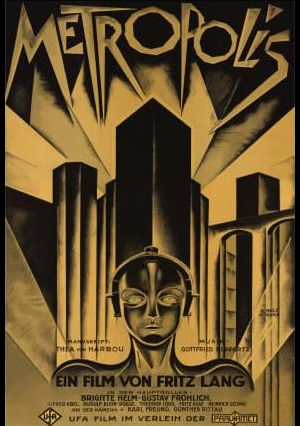 | | From the visionary director of M |
It is a century into the future. The greatest city ever built, the simply named Metropolis, is a marvel of technological progress and innovation, but at the same time, it is rife with social tension. On the surface, the city is thriving, bustling, and full of amenities, a playground of decadence where many live carefree lives of gluttony and sloth, but down beneath the surface, workers slave away in a never-ceasing schedule of hard labor to maintain the machines that hold the city together. One woman, Maria, waits for a mediator between the lower class and the upper eschelons of power, represented by the so-called master of Metropolis, Joh Fredersen, and thinks she has found it in Joh's own son, Freder. Freder understands the struggle of the working man and wants to help, but his father has different plans, conspiring with the mad scientist Rotwang to create an android to sow discord and violence.
One of the most important and influential silent films of all time, Fritz Lang's Metropolis has earned its place in history as a landmark work of cinematic art. It is utterly spectacular, with visuals that astound as much as they continue to inform filmmakers in the Twenty-First Century. It is the template for science-fiction epics on the silver screen, and it would be an unimaginable mistake to write it off as a worn-out relic belonging to a different time.
That being said, it is also important to put it in the context of history. Fritz Lang and his wife at the time, Thea von Harbou, conceived and created Metropolis during the Weimer Republic in Germany, only a few years after World War I. This was a fragile, troubled time in Germany's history, marked by starvation, poverty, social disorder, partisan political radicalization, and hyperinflation. Inequality between the rich and poor was extreme, and this is obviously reflected in the dystopic inbalance shown in Lang's film.
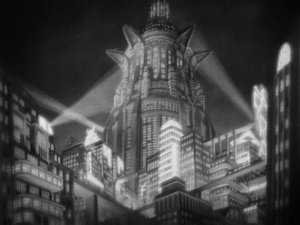 | | The New Tower of Babel |
The story was written by Thea von Harbou, as a novel. (I'll be honest with you: I tried to read it and review it first, but I couldn't get more than two chapters into it; it is pretentious, flowery, poorly written, and borderline incomprehensible, especially if you haven't seen the film.) The intention was always to make a movie from von Harbou's novel, and most of her original ideas and themes persisted into Lang's final cut of the film. Indeed, with its strong female lead (arguably, Maria is the protagonist) and heavy use of emotional appeals at its core, it has a warm, feminine quality that is all too rare in classic film.
Lang, who was more interested in the visual and technological spectacle than in the plot itself, was greatly influenced by a visit to New York and other parts of America in the early nineteen-twenties. He wanted to capture the awe of seeing a towering, vertical city thrusting humanity into a new era of science and technology, to glorify mankind's capacity for creation, even as his wife's story was more concerned with demonstrating the folly of such ambition. He made the film as a visual tour de force rather than a political statement, but that's not to say he disapproved of the message of his film; it just wasn't a top priority for him.
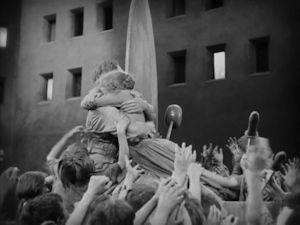 | | It's romantic and idealistic, almost to a fault |
While modern reviews of Metropolis consider it something of an anti-capitalist hit piece, that wasn't Lang and von Harbou's intention. They were both enamoured by American prosperity and wealth, and though they had reservations about the costs of such progress, they didn't want to portray it as inherently evil. Though Joh Fredersen's plan to cause a riot in order to grow his own power over the subjugated masses is clearly not morally sound, the main thrust of the film is one of peace and understanding, of cooperation for the sake of mutual benefit.
As such, it has also earned a reputation for being a socialist and/or communist manifesto. (Case in point: Lang would all but disown the film later in life, largely because it caught the admiration of Joseph Goebbels, who thought it was a perfect bit of propaganda for the National Socialists.) There are certainly elements of that in place--a lot of the film does seem to support a "workers of the world unite" kind of fable--but the story doesn't portray the working class as terribly noble. They are shown as "the hands" of Metropolis, capable of creation and destruction, as highlighted by the Tower of Babel story, but these are mindless hands that are easily manipulated into causing wanton chaos that would kill their own children. Workers are as villainous in the end as Joh Fredersen (the "head" of Metropolis), but like Joh, the film attempts to redeem them by showing that all they lack is a mediator to bind the classes together, a "heart" between the head and hands.
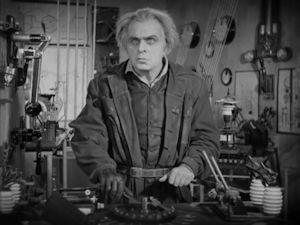 | | The Frankenstein vibe is not a coincidence |
The true antagonist of the story is neither the workers nor Joh, but the scientist Rotwang. He is driven by envy and malice, tortured by the death of Joh's wife, Hel, who died giving birth to Freder. Rotwang clearly loved her and has been trying to recreate her in the form of his "Machinenmensch," the android that Joh later tries to use for his own purposes. Understanding Rotwang is key to understanding the real conflict of the story, because it is his madness that creates all of the strife and destruction of the plot's climax. Rotwang is credited as the innovator who developed the science that made Metropolis possible, and his android is a fetishized representation of technology itself, a force that is shown to be more dehumanizing and brutal than any system of government.
Because that's what Metropolis is really about: technology, and how humanity must hold onto its heart in order to survive its inexorable growth. This is where von Harbou's humanist storytelling and Lang's eye for spectacle combine to create something truly special. This is the duality--the harmony--of Metropolis. It shows us a glorious, beautiful vision of the future, but at the same time, warns us of the horrors that future could create.
-e. magill 2/21/2019
| MORE LIKE THIS: |
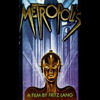
|
Metropolis Reborn
With the rumblings of a big budget Hollywood remake of Fritz Lang's Metropolis, the questions are raised: who should direct, and who should star in it? [11/10/2008]
|
|
|
|
|